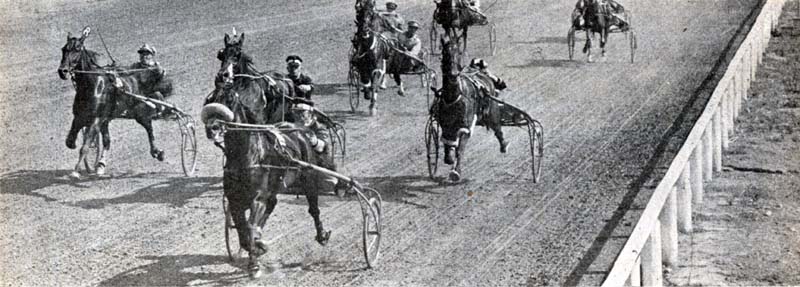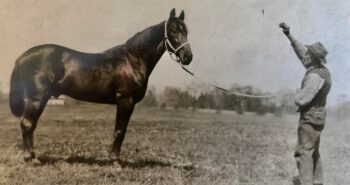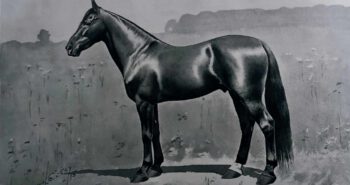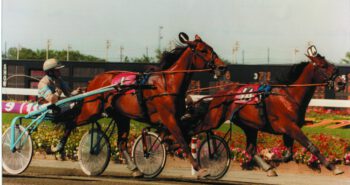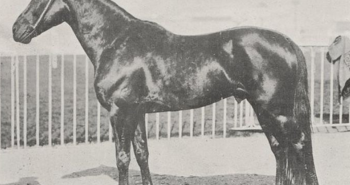It’s a good thing horses don’t know what humans expect of them, otherwise chances are high that Victory Song would have crumbled under pressure. The blue-blooded colt struggled with unsoundness throughout his career and was seen as lacking mental toughness. When it clicked, though, the horse was a phenomenal trotting machine who some people even thought could challenge Greyhound’s legendary record.
Not only did Victory Song face the near-impossible task of having to having to fill the shoes of his brother, Volo Song, but there was also the then-hefty yearling auction fee of $37,000 back in 1944 – an auction record which shattered the previous yearling record from the previous year when EJ Baker shelled out $15,000 for Algiers. The auction turned out to be a battle between EJ Baker, owner of Greyhound and Volo Song, and the 29-year-old Frances Dodge Johnson (later van Lennep). Eventually the latter’s virtually unlimited riches prevailed and Victory Song was put in the training of Sep Palin. Despite the price tag, the Walnut Hall-bred Victory Song eventually proved an excellent buy.
A slow start
Since Victory Song was slightly buck-kneed and Palin didn’t want to push things, he only raced him once at two and instead put him through rigorous training. The colt’s only start at two was a rather mediocre performance at Greenville, Ohio on August 23, 1945, when he finished third to Protem and Earl Spencer.
The following spring, Sep Palin started the high-priced 3-year-old at Santa Anita in California and almost immediately he showed signs of being a Hambletonian contender. His first race in California, where he finished out of the money, was over the somewhat odd distance of 6 furlongs (3/4 mile) but he soon got into the groove and a few days later he won his next race easily (this time over a 1 mile distance). Although the winning time of 2:10 (1.20,8) didn’t scare anybody, it was noted that Victory Song won with ridiculous ease. After another couple of wins on the east coast, Joe Neville of Delaware, a sponsor of the Little Brown Jug, offered Frances Dodge Johnson $50,000. Knowing the talent she had, the offer was declined on the spot.
In Marion, OH, on June 26, judges decided to rule Victory Song out of the betting since he was deemed too superior. But the race turned out to be more exciting as Victory Song, after taking the first heat, broke twice and only finished fifth in the second heat – though he redeemed himself by winning the third heat.
The Hambletonian failure
Even though Chestertown beat him in the National Stake at Old Orchard Beach a week prior to the Hambletonian, the Palin student trotted the fastest mile by a three-year-old when he won the first heat in 2:03 (1.16,4). In the second heat Victory Song lost by a nose, but in the third heat he wasn’t close to the leaders. Two things stood out; the Hambletonian was wide open and there were obvious question marks over Victory Song’s toughness and competitive spirit. Some seemingly unmotivated breaks didn’t help things either. Later, as a sire, there would always similar question marks surrounding the mental aspects of his get as quite a few had a reputation for exhibiting a bit of fruity or nutty behavior.
After taking the first Hambletonian heat, he broke and finished ninth in the second heat won by Chestertown. In the third heat Chestertown and Victory Song were even with a quarter to go but while Chestertown was game and gutsy, the not-always-resilient Victory Song faded and lost by a length. Sep Palin would blame then-young driver Del Miller for Victory Song’s loss, both because Miller’s horse Don Scott hit Victory Song’s wheel in him the second heat, causing him to break stride, and also because Palin felt Miller was helping Tom Berry’s Chestertown. The not always politically correct Miller responded by simply calling Palin a cry-baby.
Winning the 3-year-old trot two weeks later in Milwaukee was a minor consolation. Another week later he lowered the season record for 3-year-old trotters to 2:00 3/4 (1.15,0) at the DuQuoin State Fair. After winning the Horseman Futurity, Victory Song finally got his chance for revenge over Chestertown in the Kentucky Futurity at the end of September. Winning both heats, the son of Volomite and Evensong avenged the Hambletonian disappointment while Chestertown and Walter Spencer had to settle with sharing second money, Victory Song winning the heats in 2:01 1/2 and 2:00 1/2 (1.15,5 and 1.14,9). The following week he time trialed in 1:59 1/4 (1.14,1), a very impressive feat for a three-year-old at the time. Even though he didn’t win the Hambletonian, and thus wasn’t the winningest three-year-old trotter that year, he was widely considered the best three-year-old in 1946 after winning 19 races in 27 starts.
Chasing Rodney
On Aug 13, 1947, Victory Song lowered the world colt record for a competitive race to 1:57.3 (1.13,1) when winning the second heat of the Nancy Hanks Trot in Springfield, IL – incidentally wiping out the world record of his brother Volo Song from 1944. (As an aside; 1947 was the first year harness racing was timed by fifths of a second instead of quarters – Volo Song’s 1:57 3/4 may very well be identical to Victory Song’s 1:57 3/5 with the same timing method.) He set another record in the first heat of the Transylvania Stake, over the distance of 5/8 mile (1000 meters) with a clocking of 1:14.2, while the second heat was a mile long race – won in 2:02.1 (1.15,9). At the end of 1947 Victory Song was voted the first Harness Horse of the Year, narrowly beating Hoot Mon by 165 to 160 points.
1948 proved a disappointing year for Victory Song. He was unsound quite a bit of the time and had to be scratched in several races. When he did appear, Rodney had his number every single time. That didn’t mean Victory Song didn’t make him work for it, though. He pushed Rodney to a new three-heat record of 5:57 2/5 (1.14,0) in the Maud S Trot, where Victory Song took the second heat and Rodney the other two. For some odd reason, Victory Song was still 10th in the vote for Harness Horse of the Year with 51 points, though Rodney, undefeated all year and only losing one heat – to Victory Song – won the vote with 398 points. One can only wonder what things would be like if he was sound. Sep Palin later claimed that “Victory Song would easily have beaten Greyhound’s record if he could have been trained, but that was impossible because of his front legs.” Such statements generally need to be taken with a pinch of salt, but Palin trained Greyhound and was in a better position than most to judge.
Two active sirelines
Victory Song retired to stud at Castleton Farm at the end of 1948 with career earnings of $73,859. He proved a decent stallion but failed to throw any Hambletonian or Kentucky Futurity winners – Noble Victory was the best in the 1962 crop but failed to win the two biggest races – and ultimately his biggest impact was probably as a damsire; Speedy Scot, Savoir, Timothy T, Songcan and Songflori, Speedy Count and Brisco Hanover, to name a few, are all out of a Victory Song daughter.
Victory Song has a potent sireline in the US, however, through Noble Victory. The latter had two sons who extended the line, Noble Gesture and ABC Freight. Noble Gesture in turn produced Mystic Park and Balanced Image. The latter was a magnificent stallion, but almost all of his sons were gelded and his sons at stud were unable to further the sireline. Mystic Park sired Mack Lobell, one of the best trotters in history, but that branch of the sireline also disappeared when the latter failed to produce any sons of his own calibre. ABC Freight fared a lot better. He sired Garland Lobell who in turn sired Andover, Angus and Conway Hall. These three all have sons standing stud, and Conway Hall sired the 2004 Triple Crown winner Windsong’s Legacy, sire to Chapter Seven and paternal grandsire of Walner.
Additionally, Victory Song has also a very prolific sireline in France through his son Quick Song. The latter was exported to Italy where he sired the legendary Sharif di Iesolo, one of the better stallions of all times. Sharif di Iesolo had four sons and one daughter registered in France between 1988 and 1992 under the rules of the Franco-American protocol. His sons And Arifant, Biesolo and Capriccio were all very good racehorses and all became productive stallions with almost 4000 get between them. Capriccio sired several good trotters, most notably Quarcio du Chene, and is also the damsire of euro-millionaire gelding Elie de Beaufour as well as stallions Unique Quick and Falcao de Laurma. Biesolo sired three euro-millionaires including Giesolo de Lou, one of few trotters to ever beat Varenne, the lightning-fast Oiseau de Feux and Ipson de Mormal, the winner of the 2001 Criterium des 5 ans.
However, Victory Song’s long-term legacy in France is through And Arifant. A sire of the excellent Mara Bourbon, multiple group 1-winner, he is otherwise most notably the sire of Goetmals Wood. The latter sired almost 30 stallions including Scipion du Goutier, Prodigious and Password. All of these have sired several top trotters and stallions as highlighted by 2024 Elitlopp-winner Horsy Dream, a son of Scipion du Goutier, Go On Boy, a son of Password, and Carat Williams and Earl Simon, both sons of Prodigious. Additionally, Goetmals Wood’s son Rieussec has also sired Boccador de Simm, the injury plagued trotter who has proven himself a very good stallions with sons like Just a Gigolo and Koctel du Dain.
Victory Song died from a heart attack on July 21, 1962.
Victory song
Brown colt born in Lexington, KY in 1943. Died in Lexington, KY on Jul 21, 1962.
Volomite – Evensong (Nelson Dillon)
4, 1:57.3 (1.13,1) – $73,859
Breeder: Walnut Hall Farm
Owners: Walnut Hall Farm and Frances Dodge Johnson
Trainers: Sep Palin
Driver: Sep Palin
Groom: –

